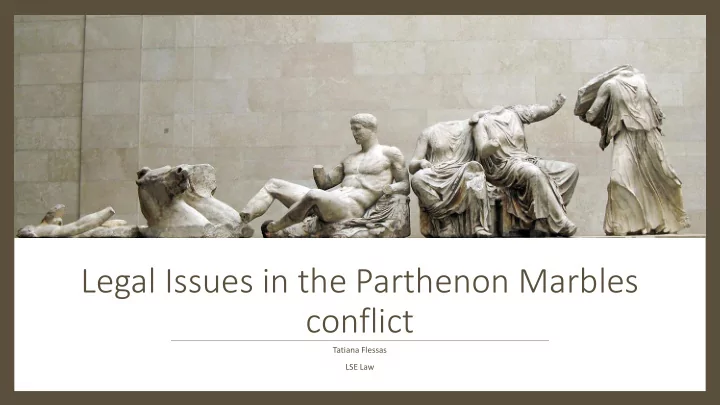

Legal Issues in the Parthenon Marbles conflict Tatiana Flessas LSE Law
‘To send or bring someone, or sometimes money or other property, back to the country that he, she, or it came from’ (Cambridge Dictionary) Root: ‘patria’ ‘fatherland’ or ‘home country’ ‘Repatriation’ (Latin) In ‘cultural property’ cases, it means the return of cultural objects to their countries or places of origin.
The very idea of ‘patria’ is complicated • https://youtu.be/uxDyJ_6N-6A
Repatriation ➢ who is/are the legal owner of the object(s)? ➢ is there a difference between the legal owner(s) claims present and the moral or historical owner(s)? both factual ➢ how were the objects transferred to where they are today? Legally? Illegally? and legal ➢ is it possible and/or appropriate to return the questions: objects?
The legally- • who owned the marbles at the time that Elgin obtained his ‘ firman ’ (letter of permission from significant the Sublime Porte) authorizing his activity on the Acropolis? issues in the • Was the firman (a) legal (document) itself? case of the • Did Elgin’s agents exceed the authority of this Parthenon document? • Was the taking ratified by the Ottoman Marbles may government later? include :
How does the (a) destruction in wartime (1954 Convention for the law protect Protection of Cultural Property in the Event of Armed Conflict (the 1954 Hague Convention) & its cultural two Protocols (1954 & 1999)) property or (b) illicit trade/trafficking (1970 Convention on the Means of Prohibiting and Preventing the Illicit heritage?: Import, Export and Transfer of Ownership of Cultural Property (the 1970 Convention)) International (c) Listing (World Heritage Convention) law (d) other international and domestic initiatives, implemented including implementing statutes, UN Security Council Resolutions, etc. domestically
As well as standard • Property Law: ‘good title’ principles of • Contract Law: ‘valid transfer’ property and contract law
But legal tools often do not get at the root of the conflict. Like ‘patria’, ‘ownership’ is also a complicated concept in this area
‘This is our history, this is our soul… [T]hey are the At issue in symbol and the blood and the soul of the Greek people… [W]e have fought and died for the Parthenon and the ‘repatriation’ Acropolis…’ (Melina Mercouri) and ‘To rip the Elgin Marbles from the walls of the British ‘ownership’ are Museum [would be] a much greater disaster than the threat of blowing up the Parthenon’ and ‘The moral identity, order dictates that Britain should keep the marbles, because Britain is the true heir of Pericles’ democracy.’ history, morality, and ‘How can we live without our lives? How will we know politics it’s us without our past?’ (John Steinbeck, The Grapes of Wrath )
Recommend
More recommend